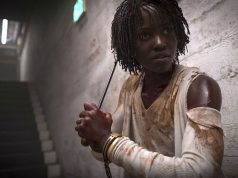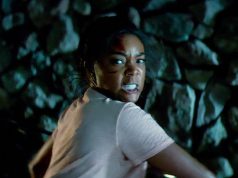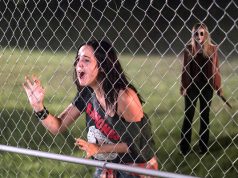David Fincher is four for four. His three previous films, “Seven,” “The Game” and “Fight Club,” were brilliantly plotted, ingeniously realized suspense-thrillers; his new “Panic Room” is right up there with them. It’s possible that as a director, Fincher is only getting better.
(We are overlooking, by the way, the fact that he also directed “Alien3.” It’s unfair to count a franchise sequel as Fincher’s own work.)
“Panic Room” has the simplest of plots. Newly divorced Meg Altman (Jodie Foster) and her androgynous young daughter Sarah (Kristen Stewart), whom I honestly thought was a boy for half the movie, move into a gorgeous old house in Manhattan. It’s a brownstone/townhouse combination — a “townstone,” the realtor calls it — with three stories, an elevator, and a “panic room.”
The panic room is a private bunker accessible from the master bedroom, to be used in the event of intruders or other threats. Once closed, its thick steel walls prevent anyone from getting in. It has its own private phone line to call the police, and surveillance monitors that show “nearly every corner of the house.” (Note the word “nearly.”)
Naturally, immediately upon moving in, Meg and Sarah are beset by a trio of burglars (Forest Whitaker, Jared Leto, Dwight Yoakam), who mistakenly believed the house was still unoccupied. These three men — who run the gamut from conflicted to psychopathic — are after something valuable left by the previous owner — something, as fate would have it, that is being hidden in the panic room itself.
It’s “Wait Until Dark,” but thematically darker, scarier and more intense. The sound mix is crisp and vivid. The camerawork is exquisite, taking us through every nook and cranny of the house — through bannisters, keyholes, walls and floors. All the elements of filmmaking combine to put us in that house, and in that panic room, with the heroines. When everything is eventually resolved, we are as relieved to have survived as anyone. (And since Fincher is the man who gave us the relentlessly bleak “Seven,” there’s no guarantee all the people we like are necessarily going to make it.)
It is not deep beyond the level of being thrilling, but the screenplay by Dave Koepp (“Jurassic Park,” “Stir of Echoes”) does have a few deft touches of character. They are small details, but at least they are details. How many thrillers try to get away with presenting a tense scenario and no characterization whatsoever? The more we know these people — even the villains — the more we can be scared for them.
“Panic Room” is a top-notch piece of filmmaking, and will be far more palatable to mainstream audiences than “Seven” and “Fight Club” were. It’s unlikely we’ll see a better thriller this year. I sort of hope we don’t. I’m not sure my heart could take it.
A (; )





